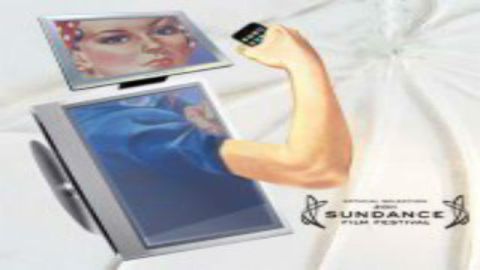“Miss Representation”. A Great Message That’s Too Simple.

Have you seen “Miss Representation”, the documentary that challenges the sexist, demeaning way the information and entertainment media depict women? See it. It’s important, and spot on…even if it is simplistic. The problem is, the powerful case the film makes that the media cause sexism (in significant measure because most decision-makers in the media are men), is naïve. It’s a version of the absolutist feminist argument that gender roles are principally, or even exclusively, determined by nurture…that nature has nothing to do with it. Which any parent of both a girl and boy knows is nonsense. Herewith, then, a gentle little story;
—
There was once a young couple, children of the 50’s and 60’s, who wanted to protect their kids from gender stereotypes, particularly stereotypes they feared could limit a daughter. Like all good liberals, they believed that children were born ‘neutral’, behavioral blank slates, on which society would not write its limiting, constraining gender rules.
Their first child was a daughter. They named her Rachel. (No gender-neutral “Dakota” or “Jessie” or “Pat”. They were serious about the gender thing, but not fanatic.) From the beginning, clothes were gender neutral; jeans and overalls and lots of stuff from Osh Kosh b’Gosh, in gender neutral colors…no frills, no skirts, no dresses (until one snuck in, a gift from Grandma at age 9 months.) Toys were gender neutral; things that would spin and make noise and engage her when she was an infant, then arts and crafts and blocks and construction kits and shovels and buckets and wind-up swimmy toys for the tub.
The couple read their young daughter a wide range of books; Goodnight Moon and Mike Mulligan and his Steam Shovel and Babar and Dr. Seuss, along with Disney Fairy Tale Classics. They screened the magazines they’d leave lying around the house, and didn’t watch any regular TV, with all its inescapable gender messages, when Rachel was in the room. They were careful about the videos they chose for their daughter, Rocky and Bullwinkle and Tom and Jerry and Sesame Street (and yes, Disney Classic Fairy Tales, which are certainly heavy on the Princess theme).
But they couldn’t keep Rachel in a box, of course. She had friends – boys and girls – and visited their homes, saw what they wore, shared their toys. Mom and Dad both worked (nice neutral role-modeling), so Rachel went to day care, a wonderful center which the parents screened in advance to make sure it was also careful about avoiding gender stereotypes. And slowly, before the parents even realized it was happening, Rachel started developing…well…shall we say, tendencies.
She preferred the games with dolls. (Her favorite object at home was Mommy Doll.) She loved to draw…princesses and mommies and, well, mostly princesses. And rainbows. And oh did she LOVE to play dress up. Dress up AND Modeling Show, in which she would decorate herself with all sorts of things – old slips from Mom’s wardrobe or old t-shirts from Dad’s – and prance and dance around to some piece of waltz music, basking in the attention of her parents as their tears of joy flowed and the video camera whirred.
Then IT HAPPENED. Her collection of dress-ups had grown as the parents had added loose bits of fabric from sewing projects or fabric stores, or hats and shirts and dresses and jackets from parental hand-me-downs or second-hand shops (along with more science toys and puzzles). One day Rachel came down to breakfast having dressed herself in several layers of everything pink and feminine she owned. She scuffled in wearing Mom’s way-too-big high heels, put her hands on her hips, snooted her nose up in the air, and declared with the absolute certainty of a two year-old discovering her power to control the world, “I’m NEVER going to wear anything but PINK, EVER AGAIN.”
The lesson was hysterical and wonderful and obvious, and Mom and Dad dissolved in laughter and hugged Rachel and told her that if that’s how she chose to dress, that was fine. And in an instant the whole pretense of thinking their daughter was a blank slate and that they could give her a gender-free upbringing and save her from the sexist influences of the male-dominated media world was thoroughly exposed as a well-meaning but innocent fraud. Their two year-old was making quite clear that SHE was NOT gender-free. She was a GIRL, and lots of the limiting social behavioral patterns her parents wanted to protect her from weren’t solely the products of external nurture after all. They were rooted in the truth of Rachel’s nature. It was like her “GIRL!” gene had finally grown frustrated and decided it was time to express itself and overtly declare that no careful control over her wardrobe, stories, TV, or anything, was going to change that part of who she was.
So it surprised Mom and Dad less when their son was born and, exposed to all the gender neutral books and toys and clothes and messages, Matt chose the trucks, turned sticks into guns, and wanted to wrestle and play mock sword battles more than dance and color. He and Rachel did play with dolls together. They gleefully called their game “Dismember Barbie”.
Mom and Dad didn’t stop teaching their kids that they could be anything they wanted to be, and do anything they wanted to do, and correct their kids when they said girls couldn’t do this or boys couldn’t do that. They continued to screen the sexist media images their kids were exposed to. But they supported their kids for who they were, a GIRL and a BOY, and supported their interests and tastes, even if that meant Rachel chose ballet classes over soccer and Matt preferred baseball and Kung Fu to piano lessons. In the end, just by being themselves, the kids taught the parents…that it’s nurture and nature, and naive to deny that gender differences are intrinsic, and that protecting their kids from sexist gender roles wasn’t a matter of sheltering them from the world as much as just giving them open minds about it.





